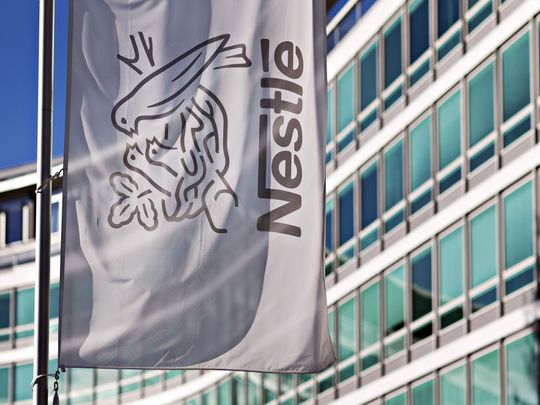
Nestle SA has entered exclusive talks to sell its skincare business to a group led by EQT Partners for 10.2 billion Swiss francs ($10.1 billion) in what would be one of the biggest private-equity deals this year.
The discussions with the consortium, which is co-led by the Abu Dhabi Investment Authority, are moving ahead as the world’s largest food company wraps up a hotly contested sale process for its moisturizers, acne treatments and wrinkle fillers. The unit had 2018 revenue of 2.8 billion francs.
Selling dermatological brands would dismantle a business that Chief Executive Officer Mark Schneider’s predecessor, Chairman Paul Bulcke, touted as a promising new avenue when he led the company. Schneider has instead been focusing on products such as coffee, water and pet food as Nestle works to spur sales and revamp growth.
Nestle said the deal is subject to employee consultations and is expected to close in the second half, at which time the food company will give details on what it plans to do with the proceeds. The buyers would pay cash and the transaction would be debt-free. Nestle shares, which have gained 22 per cent this year to record levels, were little changed in morning trading.
Weak spot
The skincare unit has been a weak spot, with activist investor Dan Loeb at hedge fund Third Point saying that Nestle’s foray into the business was unrelated to its core portfolio and should be unwound. Still, the unit attracted interest from at least a dozen potential bidders during the auction, according to people familiar with the matter.
The agreed deal is the second major transaction for EQT, the Nordic region’s biggest private equity firm, this month, following the $8 billion acquisition of fiber-network owner Zayo Group Holdings Inc. with Digital Colony Partners. EQT is exploring an initial public offering, having raised more than 60 billion euros ($67 billion) since it was started about 25 years ago. Investor AB, founded by the wealthy Wallenberg family, is the firm’s anchor investor with an ownership of about 10 per cent in its most recent funds, according to the company’s website.
For the Abu Dhabi Investment Authority, one of the world’s largest sovereign wealth funds, the investment will be its biggest ever private-equity deal and is a sign of sovereign and pension investors allocating more money on direct investments. The wealth fund teamed up with Triton to acquire IFCO, a maker of reusable food packaging, in February.
Cash injection
The deal would be the biggest in Europe so far this year. The cash injection could make Nestle well-placed for further acquisitions, though large ones would probably face antitrust issues given the Swiss company’s market position in food and beverages. Nestle’s cash pile may get even larger as it expects to sell its Herta lunch-meat business by mid-year and has put medical unit Prometheus Laboratories Inc. on review.
“I wouldn’t be surprised to see bolt-on deals in areas it has highlighted for attention, namely coffee, water, pet care, nutrition and consumer health,” wrote Jon Cox, an analyst at Kepler Cheuvreux.
The proceeds could fund another share buyback once the current program expires, Cox said. Nestle said earlier this year that it’s accelerating a program to buy back 20 billion francs worth of shares to complete it six months early.
Schneider had told reporters at the time that the company isn’t excluding further deals. However, Chief Financial Officer Francois-Xavier Roger has repeatedly said it’s a seller’s market.
Bidder interest
The skincare unit also attracted a range of bidders including KKR & Co., according to people familiar with the sale process. Some like Colgate-Palmolive Co. and Unilever NV eyed the consumer arm, while others like PAI Partners and Baring Private Equity sought the medical treatments business known as Galderma. A group that included Advent International, Cinven and Singapore’s GIC Pte. was also interested, people familiar with the matter said previously.
The skincare business was built out of a joint venture that Nestle formed with L’Oreal SA in 1981. Nestle paid the French cosmetics maker more than $3 billion to buy the business out in 2014 and in the following months paid a further $1.4 billion to acquire a portfolio of skin-care drugs from Valeant Pharmaceuticals.
Another piece of Bulcke’s legacy was undone with last week’s announcement that Nestle would halt direct-store delivery of frozen pizza and ice cream in the US, which it had started after acquiring DiGiorno and other brands from Kraft in 2010.












